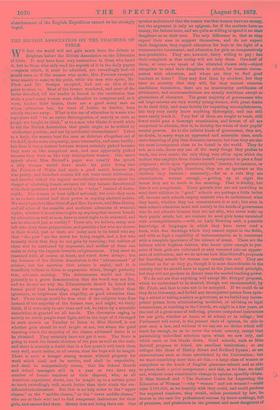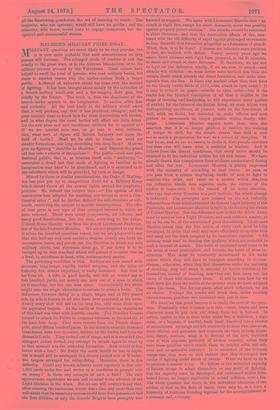THE BRITISH ASSOCIATION ON THE TEACHING OF GIRLS.
WE fear the world will not gain much from the debate at Brighton before the British Association on the Education of Girls. It may have been very instructive to those who heard it, but to those who only read the reports of it in the daily papers —reports which, it must be admitted, are exceedingly bad—it „would seem as if the women who spoke, Mrs. Fawcett excepted, were unable to come to the point, while the men who spoke, Mr. Fitch and Mr. Sturges excepted, had not an idea of the point to come to. Moat of the former wandered, and most of the latter drivelled, till the reader is forced to the conclusion that while a good many women want education to compress and, as it were, harden their brains, there are a good many men on whom education has, for want of brains to harden, been utterly thrown away. What is the use of education to a man who says there will "be an entire disintegration of society as soon as people are taught to think," or to a man who thinks it worth while to tell the British Association that grade ought to be settled by ntellectual position, and not by accidental circumstances? Taken as a body, the women beat the men as debaters altogether out of the field, spoke more eloquently, more reasonably, and more lucidly; but then it was a contest between women certainly picked because they were so like competent men, and men apparently picked because they were so like very incompetent women. One man's speech about Miss Shirreff'a paper was exactly the speech a silly woman would have made, his point being that the Princess of Wales had made a good match because she was pretty, and therefore women did not want much cultivation ; and another talked the regular materfamilias nonsense about the danger of educating female servants till they became discontented with their positions, and wanted to be " helps" instead of house: maids. The women at least talked seriously, but even they seem to us to have wasted half their power in arguing abstract points. We would put it to Miss Shirreff and Mrs. Fawcett, and Miss Davies, and all other of the sensible and moderate advocates of women's rights, whether it is not time to give up arguing that women benefit by education as well as men, have as much right to be educated, and can be educated just as readily ? There are, we believe, many men left who deny those propositions, and possibly a few who are sincere in their denial, just as there are many men to be found who say that "the poor" are the worse for being taught, and a few who honestly think that they do not gain by teaching ; but neither of them will be convinced by argument, and neither of them can resist or delay the impulse towards enlightenment. They must be reasoned with, of course, at times, and voted down always ; but the business of the British Association is the " advancement " of science, not the assertion that science is useful, and it is dreadfully tedious to listen to arguments which, though perfectly true, advance nothing. The Astronomers would not listen patiently to a grave demonstration that the world was not flat, and we do not see why the Educationists should be bored with formal proof that knowledge, even for women, is better than ignorance, or brightness than stupidity, or good education than bad. Those things would be true even if the subjects were fleas instead of the majority of the human race, and might, we really think, if it were only to save time and ink, be taken by a scientific association as granted on all hands. The discussion raging in society on which people want light, and in the hope of it thronged in such crowds on Tuesday to listen to Miss Shirreff, is not whether girls should be well taught or not, but where the good teaching which the majority of the classes addressed desire is to be obtained. They certainly have not got it now. The State is going to teach the female children of the poor as well ,as the male, and there is scarcely a doubt that in a few years it will teach them very well, much better, at all events, than the boys will be taught. There is such a hunger among women without property for work which shall not be service, and shall be respectable, and shall be comparatively secure, that the School Boards and school managers will in a year or two have any number of female teachers at their disposal, who, as all American experience shows, can be taught up to a certain point to teach exceedingly well, much better than their rivals the cer- tificated schoolmasters. But this is no help either to the " upper classes," or the "middle-classes," or the "lower middle-classes," who are at their wits' end to find competent instructors for their girls, and cannot find them. Money does not bring them out. One speaker maintained that the reason was that women have no mow, but the argument is only an epigram, for if the mothers have no money, the fathers have, and are quite as willing to spend it on their daughters as on their sons. The only difference is, that as they expect their sons to support themselves, and do not expect their daughters, they regard education for boys in the light of a remunerative investment, and education for girls as comparatively non-productive. They are, however, fairly willing to pay ; -but their complaint is that outlay will not help them. One,half of them, at least—we speak of the educated classes only—object altogether to send their daughters to school, for reasons uncon- nected with education, and where are they to find good teachers at home ? They may find them by accident, but they have no security that they will, for they -cannot examine candidates themselves, there are no trustworthy certificates of attainment, and recommendations are usually worthless except as guaranteea. of character. The great majority of governesses who ask large salaries are very worthy young women, with great desire to do their duty, and some faculty for imparting accomplishments, but they very rarely know anything thoroughly, and can still more rarely teach it. Very few of them are taught to teach, still fewer could pass a thorough examination, and fewest of all are competent to educate, that is, to develop the whole of their pupils' mental powers. As to the inferior kinds of governesses, they are, no doubt, in many ways an oppressed and miserable class, much more deserving of pity than domestic servants, but then they are also the most incompetent class to be found in the world. They do not, as a rule, know any one of the many things they profess to teach, not even music, the only thing very often upon which the mother who employs them thinks herself competent to pass a final judgment ; while upon "general subjects," history, for instance, or geography, or English literature, they are as ignorant as the children they instruct ; constantly,—for as a rule they are conscientious women enough, — getting up at night the lesson they are to teach in the morning. That is fidelity, but that is not competence. Those parents who are not unwilling to send their children to " good " schools are perhaps a little better off, because such schools employ masters who do understand what they teach, whether they can communicate it or not ; but even in such schools education must rest mainly in the hands of governesses who do not educate because they are not able, who never wake up their pupils' minds, bat are content to send girls home varnished with accomplishments,—with, as Lady Bowring said, a passable knowledge of languages in which they have never read a book, with fine drawings which they cannot repeat in the fields, and with as high a capability of instrumentation as is consistent with a complete ignorance of the science of music. These are the failures which frighten fathers, who know quite enough to per- ceive if their girls are cultivated or only veneered into an appear- ance of cultivation, and we do not see how Miss Shirreff's proposals for founding schools for women can remedy the evil. They are excellent as far as they go, though it is most discreditable to the country that we should have to appeal to the joint-stock principle, but they will not produce in decent time the needed teaching power.
We do not see that anything will except Mr. Sturges' proposal, which we understand to be desired, though not recommended, by Mr. Fitch, and that is sure not to be accepted. If we could do as they do in Germany, and forbid any incompetent person from open- ing a school or taking a salary as governess, as we forbid any incom- petent person from administering medicine, or advising on legal transactions, or teaching in the Church, we might in a few years, at the cost of a great mass of suffering, procure competent instructors for our girls, whether at home, or at school, or in college ; but Parliament will never, in the present state of opinion, be able to pass such a law, and without it we can see no device which will reach far enough, so as to cover the whole country, except that painstaking individual selection upon which we now rely, and which more or leas breaks down. Good schools, such as Miss Shirreff proposes to found, are excellent institutions ; so are colleges like those of Harley Street and Bedford Square ; so are examinations such as those established by the Universities ; but we want something more than all this,—a large class of women as competent as the heads of English grammar-schools and as able to prove their a priori competence ; and this, as we fear, we shall not, without some considerable change in opinion, speedily obtain. If Miss Shirreff and "The National Union for Improving the Education of Woman "—why " woman " and not women ?—could raise 1100,000, as we heartily wish they could, and could produce the required teachers, they would, unless protected by law, be beaten in the race for professional success by know-nothings, full of promises, and proficients in the greatest and most dangerous of all the flourishing quackeries, the art of seeming to teach. The majority, who are ignorant, would still have no guides ; and the minority, who know, would have to engage competent, but die- spirited and unsuccessful women.



































 Previous page
Previous page